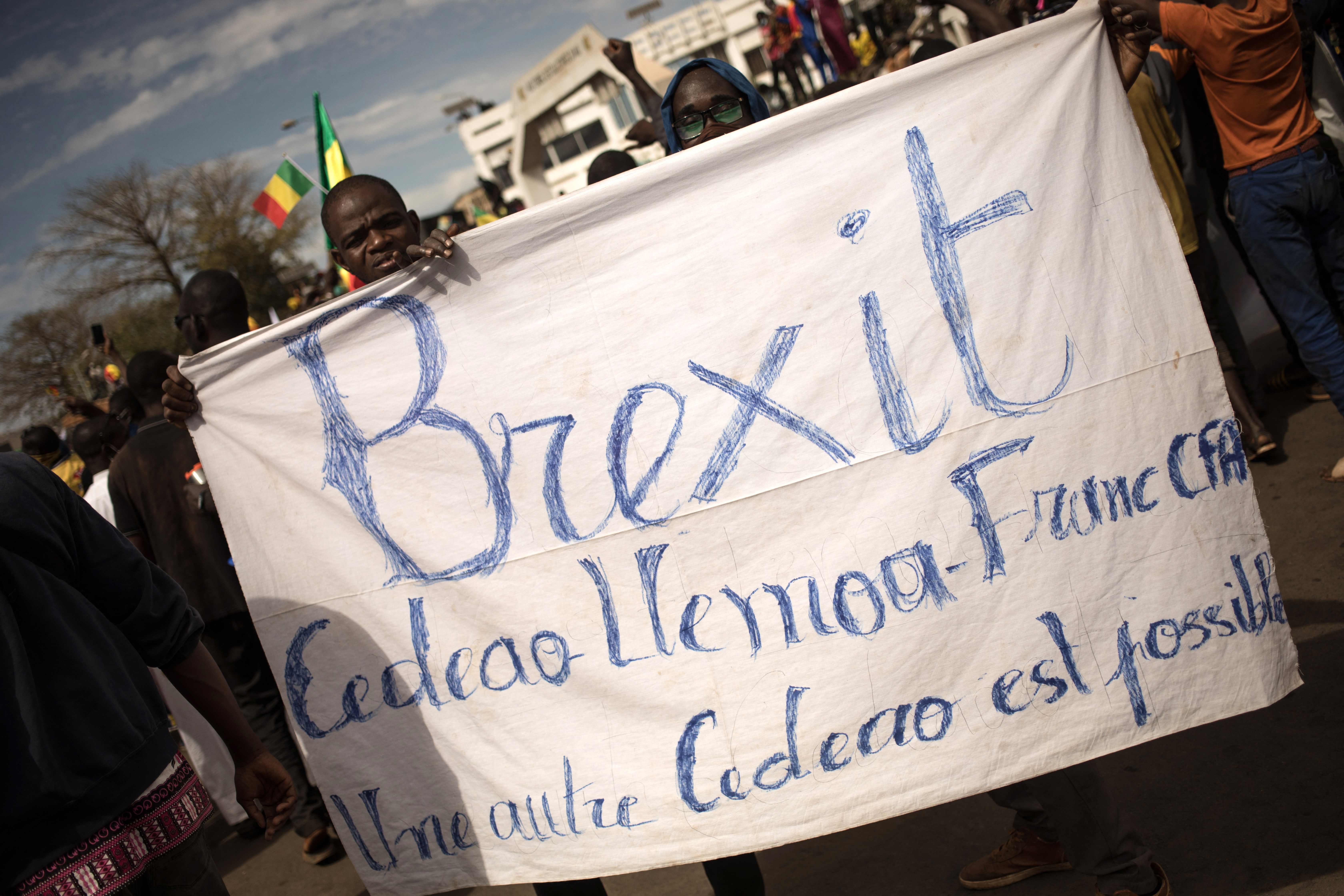A throwback to the past: Why so many African states are experiencing military coups
There have been at least five coups in the past few months across several countries in Africa and conditions are ripe for more, reports Portia Crowe


On 20 April last year, a young man in a red beret and army fatigues appeared on Chad’s national television, flanked by military officers, as his spokesman declared he would be taking over as president. General Mahamat Déby’s father, President Idriss Déby, had died earlier that day, and rather than allowing the speaker of parliament to step in, as the law stipulated, he dissolved parliament and took the reins.
The following month, in Mali, an army spokesman informed the nation in a live broadcast that their civilian president and prime minister had been detained and the military officer Assimi Goïta would take charge. It was Mali’s second coup in nine months.
Similar scenes played out in Guinea in September, Sudan in October and, just last week, in Burkina Faso. On Tuesday, heavy gunfire reportedly rang out in the capital of Guinea-Bissau, in what could be yet another coup attempt.
While most of these countries were facing political, economic or security crises – conditions that often set the stage for military interventions – five putsches in nine months is nonetheless remarkable.
“For me, who was around in the Seventies and the Eighties as a young college student, it’s a throwback to that era of military regimes,” said Christopher Fomunyoh, senior associate for Africa at the National Democratic Institute for International Affairs. “The only thing that’s changed is the coup-makers of today are trying to be more polished in their approach – they’re trying not to kill the head of state.”
What is driving the surge? Analysts say a combination of domestic factors, including the economic pain of the pandemic, and a shifting regional and geopolitical landscape have created a perfect political storm.
According to the University of Birmingham’s Nic Cheeseman, author of Democracy in Africa, the past nine months have been “exceptional,” but not entirely surprising.
“The coups that we’re seeing are all in places where we might have expected to see coups, they’re all countries that have had coups before, all countries with relatively interventionist militaries and with relatively unstable democracies.”
The context for each situation varies, but Faith Mabera, a senior researcher at think tank the Institute for Global Dialogue, said the juntas nonetheless appear to be following a “playbook”.
“They are very adept at reading the signs, and by signs I mean the popular discontent with how governments are managing the worsening public security situation because of the jiihadist violence,” she said. “They are also very adept at linking their own demands to this popular sentiment.”
Coups often occur amid political crises. Recent examples include Mali’s disputed legislative elections in 2020 and the now-ousted Guinean president Alpha Condé’s decision to change the constitution and seek a controversial third mandate.
The latter “was forced through with a lot of political violence, a lot of people detained, a lot of people forced to go into exile,” said Alioune Tine, the founder of the think tank Afrikajom Centre. “There was no more freedom – a total political impasse.”

Failed security systems are another factor. Burkina Faso’s deteriorating security situation was a primary reason cited by the new junta, led by Paul-Henri Sandaogo Damiba, for seizing control. (Damiba is the latest in a line of western-trained soldiers who have gone on to lead coups at home. Others include Guinea’s junta leader Mamady Doumbouya and Mali’s Goïta.)
A third element is the economic effect of the Covid-19 crisis, which has complicated access to food and livelihoods. According to research by the European Commission, some 23 million people across seven Sahelian countries were in need of emergency food assistance in 2021.
Bakary Sambe, of the Timbuktu Institute, said those factors have aggravated long-standing issues, such as “the lack of legitimacy with the west African leadership, the rise of religious movements which have benefitted from the weakening of the secular civil society, [and] the very populist movements which are rising in the context of very hard economic crises after the pandemic”.
Then there is the question of consequences.
When Mali’s new military regime declared in early January that it would push back elections – originally promised for February – until 2025, the Economic Community of West African States, or ECOWAS, responded by announcing sanctions and closing borders with the landlocked country.
But neighbouring Guinea’s new military junta broke ranks and agreed to continue allowing Mali access to its port. The regional bloc’s waning influence is coupled with a credibility problem.
“The criticism against ECOWAS and other regional bodies is their lack of reaction in terms of taking remedial steps that deal with the circumstances that provoke coups,” said Fomunyoh.
Critics say the union has not done enough to address bad behaviour by civilian governments – such as flawed elections, the erosion of the rule of law, and human rights violations – in addition to military coups.
That is partly because a coup makes a more easily identifiable red line than other violations. But, Cheeseman said, while sitting heads of state have an interest in speaking out against military coups, they also have an interest in not speaking out against opaque elections or constitutional tinkering – tactics that may serve their own needs down the road.
The regional bloc’s members currently include Ivorian president Alassane Ouattara, who recently changed the constitution to give himself a third mandate, and Senegal’s Macky Sall, who has reportedly considered doing the same thing.

“It is a union of presidents who are defending their own political interests and neglecting good governance and rule of law,” said Sambe.
The broader international community has also been ambiguous in its response to recent anti-democratic shifts.
“In the Nineties, when a regime in an African country broke the rules of democratic game, it was exposed to sanctions from international partners,” said Sambe. “Today, this fear has been completely dispelled by the availability of donors with less regard for transparency, the rule of law and human rights.”
In other words, if a junta gets hit with sanctions, Russia, China, Turkey, Saudi Arabia or Qatar can step in to fill the financial void.
It is a shift from the Cold War era, when both western and eastern powers held “blind alliances with autocratic regimes” for political purposes, according to Fomunyoh.
Then, after the collapse of the Soviet Union, the west began to focus on human rights and civil liberties in their diplomatic relationships. Authoritarian African regimes began to collapse.
But today, Russian forces are supporting the Malian junta and a Kremlin-linked paramilitary group has already offered its services to Burkina Faso’s new military rulers. Demonstrators were seen flying Russian flags in Ouagadougou last week. Meanwhile western leaders have taken their “eyes off the ball”, Fomunyoh said. France, which has been fighting insurgents in the Sahel since 2013, began withdrawing troops last year.
“Russia and China don’t care about democracy, the US is disengaged, fighting so many battles at home, the UK is relatively disengaged – when was the last time Boris Johnson said anything significant about Africa?” said Cheeseman. “With that context, you might think it’s easier to get away with a coup.”
An acute example of western ambiguity was France’s response to Chad’s takeover last spring. The Chadian military has been an important ally for France in its fight against jihadists in the region, and rather than condemning the younger Déby’s power grab, President Macron personally attended the state funeral for his father.
“When the French president flies to N’djamena to stand beside a young man in uniform who has just staged a coup – that’s what it was – to replace his father who is another military leader who had just been in power for 30 years, that sends a negative message to pro-democratic elements not just in Chad but across other African countries,” Fomunyoh said.
France has since condemned the coups in Mali and Burkina Faso.

While the situations in Mali, Guinea and Burkina Faso were significantly different than in Chad and Sudan (which also experienced a coup in 2019), analysts pointed to possible spillover effects.
“In the case of Sudan, for example, it’s a military that’s been in power for over 30 years that wants to hold onto the old habits,” Fomunyoh said. “The Sudan explanation is also relevant for Chad, which shares a border with Sudan, where military rule had also been accepted as part of the governing architecture.”
The others, he said, had been experimenting with democratic governance the past few decades. But, aggravated by security, economic and constitutional problems, their militaries may have been inspired to seize power by their Sahelian belt neighbours.
Analysts stressed that, despite celebrations in the streets following some of the recent coups, military takeovers tend to do more harm than good.
They are “a symptom of the crisis of democracy, not a remedy”, Tine cautioned.
“I’m hearing a lot from my African brothers and sisters who are joyful about the coups that have just happened, and I think they are making a mistake, because you can’t trust the military to be able to remedy the grievances that citizens have,” said Fomunyoh. “You also cannot trust them to go back to the barracks.”
Coups weaken the rule of law, sending the message that “you can hold power through the gun”, Cheeseman said. They typically engender worse economic performance, and they create more instability and often lead to further coups.
But that does not mean we won’t see more, especially in the Sahel.

“The ingredients are there – the sub-region is becoming more fragile, they are still facing external threats from violent extremists,” said Fomunyoh. “Militaries are still being mobilised … and one cannot exclude that some of those militaries would be tempted to try to emulate what some of their colleagues have done in other countries.”
The real tragedy, in Fomunyoh’s view, is that the increase in coups is happening while the affected countries face serious external threats.
“Rather than spending time reviewing military strategy … or engaging in further training or getting their expertise in countering violent extremism ... it’s unfortunate that some of the officers are spending their time scheming about how to get involved in the political process, and how to shoot their way into state house,” he said.






Join our commenting forum
Join thought-provoking conversations, follow other Independent readers and see their replies
Comments